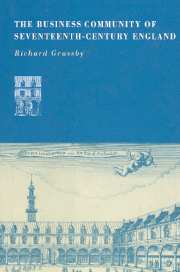Book contents
- Frontmatter
- Contents
- List of figures
- List of tables
- Preface
- List of abbreviations
- Explanatory notes
- Introduction: Questions and sources
- Part 1 Business as a career
- Part 2 Paths to fortune
- 5 The pattern of recruitment
- 6 Skills and motivation
- 7 Politics and government
- 8 The measure of success
- Part 3 Life styles
- Conclusion: Private enterprise in a pre-industrial economy
- Bibliography
- Index
7 - Politics and government
Published online by Cambridge University Press: 02 December 2009
- Frontmatter
- Contents
- List of figures
- List of tables
- Preface
- List of abbreviations
- Explanatory notes
- Introduction: Questions and sources
- Part 1 Business as a career
- Part 2 Paths to fortune
- 5 The pattern of recruitment
- 6 Skills and motivation
- 7 Politics and government
- 8 The measure of success
- Part 3 Life styles
- Conclusion: Private enterprise in a pre-industrial economy
- Bibliography
- Index
Summary
What were the political principles and affiliations of merchants and can they be credited with an independent and coherent agenda? Did they do more than defend their economic interests and how significant a role did they play in national and regional politics? It is not easy to reconstruct the political views of the silent majority who did not take part in the theoretical debates over the constitution or formulate an ideology; the evidence is strongly biased towards the committed. Participation in government is much easier to assess. Businessmen were the primary managers of the quasi-public chartered Companies and they served alongside professional administrators in a variety of government offices at both the central and local levels. Which branches of government did they find particularly attractive, how relevant were their business methods and experience and what influence could they exert on policy?
Political ideology
Businessmen were to be found on both sides of every controversy and a minority positioned themselves at each extreme of the ideological spectrum. National issues spilled over into the overseas factories and urban communities. Merchants identified liberty with property rights and opposed arbitrary actions by the executive; they favoured the rule of law and government by Crown in Parliament and they resided ‘where they are most secure’. But property was a term with many meanings and businessmen disagreed about the most appropriate division of power and responsibility between competing institutions. Their political loyalties were not just determined by their occupation, wealth or type of trade; on the great issues of the day, the business community divided vertically and not horizontally.
Before the outbreak of the Civil War, many merchants participated in the efforts within and outside Parliament to defend the status quo against the innovations of the Crown.
- Type
- Chapter
- Information
- The Business Community of Seventeenth-Century England , pp. 204 - 233Publisher: Cambridge University PressPrint publication year: 1995



